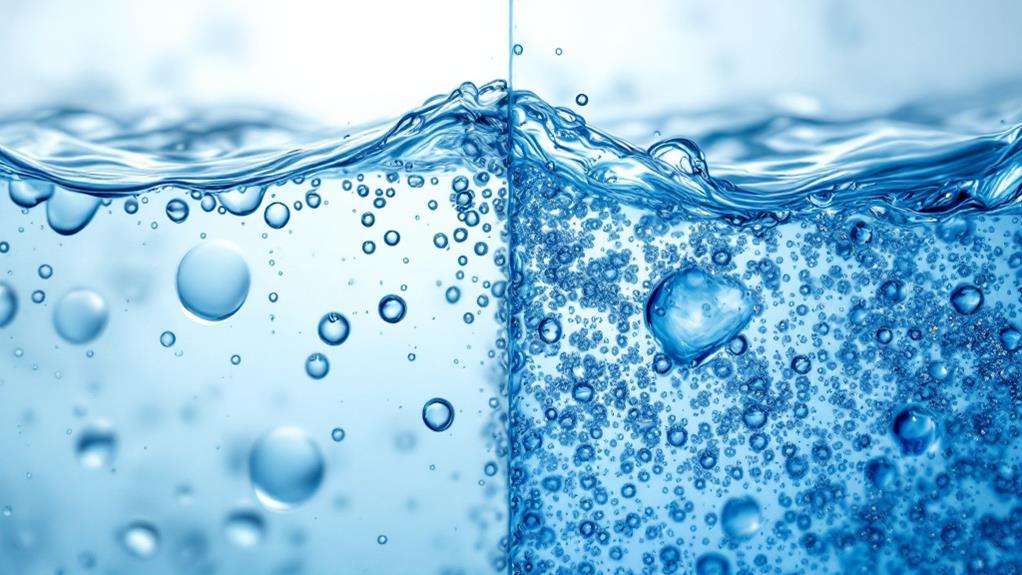Reverse Osmosis vs. Carbon Filters: Which Is Best for Your Home?
When choosing between reverse osmosis (RO) and carbon filters for your home, consider your specific needs. RO systems are highly effective, removing up to 99% of contaminants, but require higher water pressure and can be wasteful. Carbon filters are more cost-effective and don't need high pressure, but they're less effective at removing dissolved solids and heavy metals. RO produces superior water quality but is more expensive and maintenance-intensive. Carbon filters are budget-friendly and easier to maintain but may not tackle all contaminants. Your decision should depend on your water quality, budget, and environmental concerns. Plunge deeper to make the best choice for your household.
Understanding Reverse Osmosis Systems
Reverse osmosis systems are state-of-the-art water filtration solutions that offer unparalleled purification. These RO systems use a semipermeable membrane to remove up to 99% of dissolved solids, including bacteria, heavy metals, and other contaminants from your water. Unlike carbon filters, which primarily focus on improving taste and odor, reverse osmosis provides exceptionally pure, crystal clear water for your home.
You'll find that RO systems are designed to be compact and efficient, typically installed under your kitchen sink. They often incorporate multiple stages of filtration, including pre-filters to safeguard the membrane and post-filters to amplify taste. This thorough approach guarantees superior water quality compared to traditional carbon filters.
While reverse osmosis excels at removing impurities, it's crucial to recognize that it also eliminates beneficial minerals from your water. You may need to ponder mineral supplementation to maintain ideal levels. Despite this drawback, the unmatched purification capabilities of RO systems make them an excellent choice for those seeking the highest standard of water filtration in their homes.
Carbon Filters Explained
Simplicity defines carbon filters, making them a popular choice for water purification. These water filters use activated carbon to remove impurities through a process called adsorption. As water passes through the filter, contaminants like chlorine, mercury, and pesticides are trapped on the carbon's surface, improving both taste and smell.
Carbon filters come in two main types: granular and carbon block. Granular filters offer a high surface area for adsorption, while carbon block filters are known for their effectiveness in removing a wide range of contaminants. Both types excel at eliminating chlorine and organic compounds from your water.
You'll find carbon filters easy to install and maintain, with most lasting 6-12 months depending on size and usage. They're a cost-efficient option compared to reverse osmosis systems, though they require more frequent changes. When choosing a carbon filter, consider your water quality and usage needs. Remember, while these filters considerably improve water taste and reduce many contaminants, they may not remove all impurities. Routine replacement is essential to guarantee ideal filtration performance and sustain the quality of your drinking water.
Comparing Filtration Effectiveness

Effectiveness stands at the forefront when comparing reverse osmosis and carbon filtration systems. When you're choosing a water filtration system for your home, it's vital to understand the capabilities of each.
Reverse osmosis (RO) systems are the heavy hitters in water purification. They can remove up to 99% of dissolved salts, bacteria, and heavy metals like lead. With pore sizes around 0.001 microns, RO filters effectively eliminate bacteria, viruses, pesticides, and even sugars. They're your best bet for exhaustive contaminant removal.
Carbon filters, while less thorough, excel in specific areas. They're primarily effective at removing chlorine, organic compounds, and large particulates. With pore sizes ranging from 0.5 to 50 microns, they're great for improving water taste and odor. However, they're less effective at removing smaller contaminants and don't address total dissolved solids (TDS).
While RO systems provide superior filtration, they also remove beneficial minerals. Carbon filters retain these minerals but can't match the overall purification level of RO. Your choice depends on your specific water treatment needs and whether you prioritize exhaustive filtration or mineral retention.
Cost and Maintenance Considerations
While effectiveness is a key factor in choosing a filtration system, cost and maintenance also play a significant role in the decision-making process. When comparing reverse osmosis and carbon filters, you'll find significant differences in these areas.
Reverse osmosis systems have higher initial installation costs but require less frequent maintenance. You'll typically need to replace the membrane and prefilters every 2-5 years. However, these systems waste a portion of filtered water, potentially increasing your water usage and costs.
Carbon filters, on the other hand, are more affordable upfront but need more frequent attention. You'll need to replace filters every 6-12 months, depending on usage. This simpler maintenance process involves only changing the filter cartridge.
While reverse osmosis systems may have higher long-term costs, they offer superior water quality by removing dissolved salts and other contaminants more effectively than carbon filters. You'll need to weigh this benefit against the increased water usage and potential higher costs.
Ultimately, your choice between reverse osmosis and carbon filters will depend on your budget, maintenance preferences, and desired water quality. Consider these factors carefully to determine which system best suits your home's needs.
Health and Environmental Impact

Water quality directly impacts your health and the environment. When choosing between reverse osmosis and carbon filters, consider their effectiveness in removing contaminants and their environmental impact.
Reverse osmosis systems excel at eliminating up to 99% of contaminants, including heavy metals, bacteria, and microplastics. This thorough filtration process provides you with exceptionally safe drinking water. However, these systems generate waste water, which may raise environmental concerns.
Carbon filters, on the other hand, effectively remove chlorine, organic compounds, and sediment. They improve water taste and quality while maintaining beneficial minerals. With a smaller environmental footprint and no waste discharge, carbon filters are often considered more eco-friendly.
Both systems require regular filter changes to prevent the growth of harmful bacteria and maintain vital performance. This maintenance is essential for ensuring continued health benefits and water quality.
Your choice between reverse osmosis and carbon filtration should depend on your specific water quality concerns. If you're dealing with severe contamination, including heavy metals or microplastics, reverse osmosis might be the better option. For general improvement in taste and removal of common contaminants like chlorine, a carbon filter could suffice while minimizing environmental impact.
Choosing the Right System
Selecting the ideal water filtration system for your home isn't a one-size-fits-all decision. To choose between reverse osmosis (RO) systems and carbon filters, you'll need to assess your water quality and filtration needs carefully.
Reverse osmosis filters offer comprehensive purification, removing a wide range of contaminants from your water supply. However, RO systems also filter out beneficial minerals, which may require mineral supplementation. On the other hand, carbon medium filters focus on improving water taste and odor, making them a simpler option for some households.
Consider the cost, maintenance requirements, and installation complexity of each system. RO systems typically require more upfront investment and ongoing maintenance, while carbon filters are often more budget-friendly and easier to install.
To make an informed decision, consult with a water treatment professional. They can help you evaluate your specific water filtration needs and recommend the most appropriate system for your home. Whether you choose reverse osmosis or carbon filters, ensure that your selected system aligns with your water quality goals and lifestyle preferences to enjoy clean, filtered water customized to your needs.

